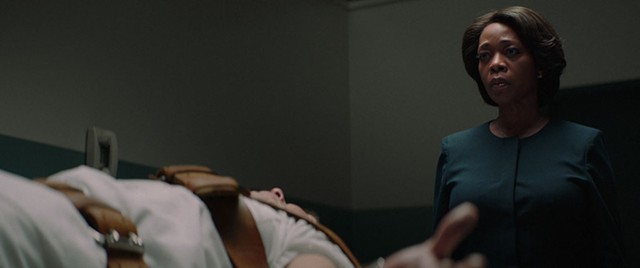
- DEATH BE NOT DERIVATIVE Chukwu’s jailhouse saga is undermined by her reliance on Lifetime movie melodramatics
A couple of things are going on in writer-director Chinonye Chukwu's sophomore feature effort. One is an intermittently riveting evocation of how it might feel to be a prisoner awaiting execution on death row. The other — and this facet of the film receives considerably more time and attention — is an evocation of how it might feel to be a female official responsible for overseeing the process of corporal punishment. One of these narrative strands proves substantially more compelling than the other.
Alfre Woodard stars as Warden Bernadine Williams. As the movie opens, we find her presiding over her 12th execution in seven years. Practice has not remotely made perfect at her facility, however. A medical technician so thoroughly botches the job of pumping poisons into the condemned man's veins that, just as he finally appears to have expired, he suddenly convulses back to agonizing life. Bernadine is forced to close the curtain between the prisoner and his family in the adjoining room.
At work, the warden is able to maintain her businesslike façade in the days that follow. After work, not so much. Among the questionable choices in Chukwu's script is her character's coping strategy: getting hammered at a local bar on a regular basis. Maybe it's me, but the notion of so prominent and recognizable a figure routinely getting sloshed in public rang false, not to mention a little lazy. Kind of a tired trope.
Driving Bernadine to drink even more and sleep even less (though we're never explicitly told this is the reason for her behavior) is the fast-approaching execution of a prisoner named Anthony Woods. He's played by Aldis Hodge in a performance I found impressively inventive. It's the heart and soul of the movie, its window into the death row experience.
Most of the film revolves around Anthony's date with his demise in one way or another. In several scenes, his lawyer (Richard Schiff) entreats the warden, reminding her of the growing public sentiment that Anthony was wrongly convicted of shooting a police officer. Again, though, this element of the script seems questionable. What are we supposed to imagine Bernadine might do? She's a warden. She can't grant a stay or commute a sentence.
The more cogent and affecting scenes are the ones between Anthony and the warden, especially those in which Bernadine prepares him for the end. The filmmaker claims to have spent four years researching the death penalty and related matters. If there's evidence of that work in her picture, it's in small details such as the way Bernadine refers to the execution as "the procedure" and the palpable absurdity of her thinking Anthony gives a crap about the menu for his last meal. Throughout these sequences, a mute Anthony looks at Bernadine like she's out of her mind. For better or worse, these are Clemency's most eloquent moments.
Unfortunately, the director defaults with dispiriting frequency to stilted melodrama. Straight out of the Lifetime movie playbook are the yawning divide between Bernadine and her English teacher husband (Wendell Pierce) — who actually reads to his high school class from Ralph Ellison's Invisible Man — as well as the corporal punishment protesters chanting generically outside the prison day after day, and Michael O'Neill's wise and kindly chaplain.
Even more cringingly egregious: Chukwu tugs on the audience's heartstrings by turning Anthony into a dead man drawing. Grab a tissue. His cell is covered with poignant sketches of birds in flight. Yup, free birds. I'm sorry. For some misdeeds, no pardon is possible.





Comments
Comments are closed.
From 2014-2020, Seven Days allowed readers to comment on all stories posted on our website. While we've appreciated the suggestions and insights, right now Seven Days is prioritizing our core mission — producing high-quality, responsible local journalism — over moderating online debates between readers.
To criticize, correct or praise our reporting, please send us a letter to the editor or send us a tip. We’ll check it out and report the results.
Online comments may return when we have better tech tools for managing them. Thanks for reading.